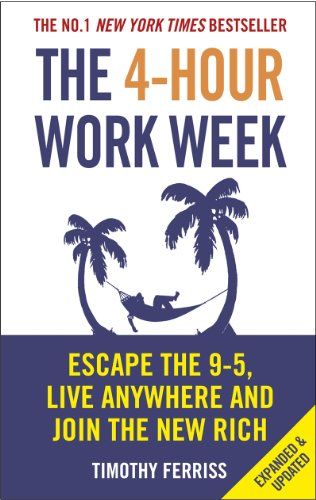Why the 4-Hour Work Week is a Myth but the 4-Hour Work Day is a Reality
Tim Ferriss popularised the idea of the 4-hour workweek, although it is a myth. It takes a lot of work to generate the promised passive income. On the other hand, by concentrating on productivity and essential activities, many people can achieve a 4-hour workday. This post will show you how!
The idea of the 4-hour work week has been circulating for some time now, and while it may sound like an attractive idea, the reality is that it is a myth.

The 4-Hour Work Week: Escape the 9-5, Live Anywhere and Join the New Rich
"The 4 Hour Work Week" by Tim Ferriss is a self-help book that provides a blueprint for a lifestyle design that emphasizes outsourcing, automating, and simplifying one's life to attain financial freedom and enjoy more leisure time. It advocates for creating a "New Rich" lifestyle by freeing oneself from the traditional 9-to-5 work routine and maximizing efficiency through outsourcing and other strategies. The book covers automation, outsourcing, lifestyle design, and entrepreneurship. It encourages readers to explore alternative ways of earning money, such as starting a business or investing in passive income streams, to achieve financial freedom and live a more fulfilling life.
Author Tim Ferriss popularised the concept of the 4-hour week in his book of the same name. The book motivates you to think about how you can use leverage, like money, content, and scaling intellectual property like an app, to build a system where your income is unrelated to the amount of time you put into it.
In short, the book's pitch is basically to become a content creator or e-commerce merchant with a lot of outsourcing and automation.
However, the problem with these "passive income" business strategies is that they require significant effort to generate the promised passive income.
Most of us can't live up to the book's promise. Potemkin villages have popped up in my research of company strategies that promise passive revenue. The models' inner workings do permit income to be uncoupled from one's effort involved.
The term originated from a story about Grigory Potemkin, a Russian statesman who, in the 18th century, built elaborate mock villages along the banks of the Dnieper River to impress Catherine the Great during her visit to the Crimea.
These villages were meant to give the appearance of prosperity and modernity but were empty structures with no actual residents.
The phrase "Potemkin village" has since been used to describe any situation where a false appearance is created to deceive others into thinking that everything is better or more impressive than it is.
Yet, even in these passive income models, the list of weekday responsibilities is staggering.
However, a 4-hour workday is achievable and a reality for many individuals and businesses.
In this article, I will explore why the 4-hour workweek is a myth and how the 4-hour workday can become a reality for you.
The 4-Hour Workweek: A Myth

The 4-hour workweek is a concept that aims to create a revenue stream through outsourcing and the intelligent use of technology.
Think of an example. Imagine that your current 9 to 5 employment consists of producing and monetizing blog posts. You have the idea of hiring an AI to make your blog posts. This is now genuinely achievable, thanks to ChatGPT.
Instead of writing the blog posts, your 9–5 will be spent managing and instructing the AI. There is still a tonne of work to be done, just different work.
Let's take it another step further. Your new idea is employing people to run the AI for you. So, what ends up happening? At that point, you are working 9 to 5, managing your staff and expanding the company strategically.
When you automate or outsource an activity, a new challenge will pop up and add to your workload and stress levels.
Of course, this could be profitable; after all, your business is now leveraged, which means you'll likely generate more revenue and earn more money.
However, you won't have any less work. It's merely a different kind of work.
The 4-Hour Work Day: A Reality

The 4-hour work day, on the other hand, is a reality for many individuals and businesses. Focusing on productivity and efficiency and prioritizing the most critical tasks makes it possible to accomplish a great deal in just 4 hours.
I came to this realisation a few years ago when I changed teams and bosses inside my organisation.
I initially believed that my supervisor was exceedingly slack, disorganised, and unprofessional because he was hard to get a hold of and seemed to work barely four hours a day.
- He occasionally showed up to meetings late or not at all.
- He didn't give some demands and chores any attention or care.
- He occasionally generated sloppy work products with solid content but neglected presentation.
And: He was also highly successful and well-liked by both management and his peers.
I'm sorry -- What? You did not misread; no. He solved some of the company's most considerable difficulties and was incredibly productive. To all appearances, he was a tremendously successful couch potato.
Because I was the polar opposite at the time, I found his traits to be deeply upsetting. I took satisfaction in doing everything I was asked to do without error or omission and found that I usually did well enough. At the same time, he was selective and sloppy while being extremely successful.
In these situations, it is advisable to take a moment to examine the root causes of your anger and why it is being directed towards others.
I have come to understand that my former boss was not lazy but highly focused and efficient in his approach.
He was dedicated to achieving results, recognizing that as organizations grow, there is a tendency for employees to become bogged down in non-essential tasks. These distractions slid off of him as he only cared about making substantive progress and was uninterested in pleasing others with superficial duties.
This is precisely what management valued in him, as they, too, were only concerned with actual results.
Upon reflection, I realized that my approach was flawed as I wasted up to 50-75% of my time on unproductive tasks that served no purpose for the organization or myself. I was wasting my own time, time that could be put to better use, and negatively affecting my colleagues.
Inspired by my former boss, I have been striving to adopt his outcome-oriented approach, focusing only on what truly matters. Of course, since you can't just get out of your skin, you can't do it from day to day. But the path and the benefits are apparent.
Imagine what this could mean for you! You could potentially maintain your current level of results in just a few hours a day or free up extra time to tackle new projects and achieve even more.
It is possible to work smarter, not harder, by simply avoiding non-essential tasks. This shift in mindset and approach will lead to a more productive, fulfilling, and satisfying work experience.
How to achieve the 4-hour workday?

So, how can you achieve the 4-hour workday? Here are a few tips to help you get started:
- Prioritize your tasks: Identify the most critical tasks that need to be done in a day and focus on completing those first. This will help you maximize your time and effort.
- Limit distractions such as emails, social media, and unimportant phone calls. Set aside specific times for checking your emails and responding to messages.
- Use technology to your advantage: Automate repetitive tasks (e.g. ChatGPT), use productivity tools to stay organized, and take advantage of virtual meeting platforms to save time and reduce the need for travel.
- Say no to non-essential tasks: Consider strictly declining tasks that are not critical to your business but still take up a lot of time.
- Learn to delegate effectively: Delegating tasks to team members will reduce your workload and help others develop new skills and take on more responsibility.
- Set boundaries: Establish clear boundaries for work and personal time. Avoid working outside your designated work hours, take breaks, and disconnect when not working.
- Focus on results, not time spent: The key to achieving the 4-hour workday is to focus on outcomes rather than the amount of time spent working. Ensure you work efficiently and effectively, and avoid being bogged down in unproductive tasks.
Sadly, this gets a little buried in the list of points, but the core is a perspective shift and subtraction:
- A shift in perspective: Consider how every action you take will ultimately add value for you, others, or the organisation. You consistently respond "no" if the value is less than the value of your time input.
- Subtraction: Your task management system may have 70 checklist items, but I'll bet you that only 12 are essential right now. You can easily delete the remainder.
Two additional key considerations are crucial to attaining satisfaction in your work. Firstly, to truly feel fulfilled, it's important to strike a balance between fulfilling essential work tasks and pursuing your own personal goals. A 50-50 split is ideal.

Secondly, it's easy to become sidetracked and lose focus, even focusing solely on essential tasks. Distractions come in many forms, such as emails, smartphone notifications, and instant messaging platforms like Microsoft Teams. To combat this, it's recommended to prioritize your willpower and focus on the most pressing task of the day during the morning hours, then allow for open communication and collaboration in the afternoon.

Conclusion
This article concludes that while the idea of the 4-hour workweek is an attractive concept, it is in fact a myth. The notion of freeing oneself from the traditional 9-to-5 work routine and achieving financial freedom through outsourcing and automation is appealing. Still, the reality is that it requires significant effort and a great deal of work to generate the promised passive income.
Most people can't live up to the promise made in "The 4 Hour Work Week" by Tim Ferriss, as the models for creating passive income are often based on Potemkin villages.
However, the 4-hour workday is a reality for many individuals and businesses. Focusing on productivity, efficiency, and prioritizing critical tasks can enable one to accomplish a great deal in just 4 hours.
This reality was highlighted in my personal experience, where a change in teams and bosses led to the realization that a successful and well-liked colleague seemed to be working only four hours a day but was highly productive and efficient with his time.
The key is to embrace new ways of working and to prioritize the most critical activities rather than simply trying to reduce the amount of time spent working.
Feel free to add your tips and thoughts to this page's comment section, Twitter or LinkedIn!
Best regards,
-- Martin from Deliberate-Diligence.com



Discussion